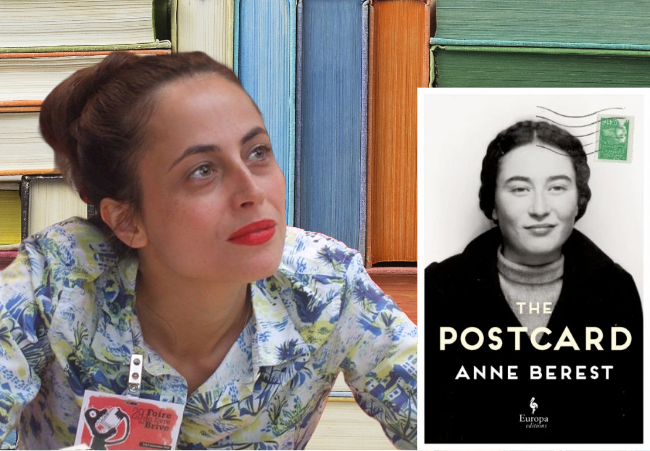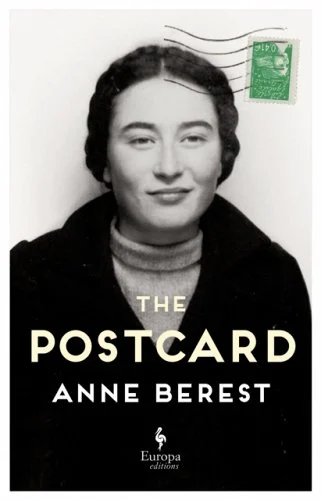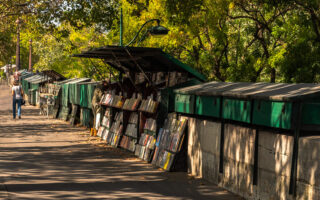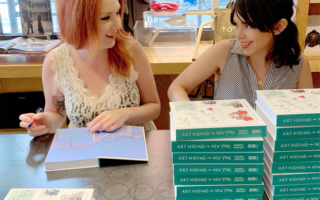Book Review: The Postcard by Anne Berest
La Carte Postale, the best-selling novel by Anne Berest, was first published in France in 2021; the French version won numerous awards, including the first-ever Goncourt Prize US. An English language edition, very nicely translated by Tina Kover, was published in 2023, and a paperback edition will be released in the US in May.
Although it is presented as a novel, the story is true, and historical — the author calls it un roman vrai — based on extensive research into the author’s family history by both her and her mother, Lélia Picabia.
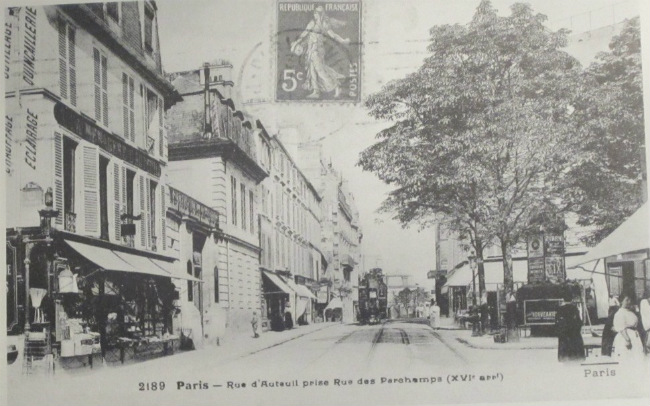
Vintage postcard of Rue d’Auteuil
The story begins (in a way) when a mysterious postcard arrives at the home of the author’s parents in suburban Paris, in 2003. The postcard is anonymous, and the only “message” on it is the handwritten names of four members of Lélia’s family who were deported from France in 1942 and perished in Auschwitz. After an initial family discussion about who the postcard could have come from, and what the motivation could have been for sending it, it is tucked away in a drawer and essentially forgotten for some years.
But the author remembers the postcard when she is pregnant with her first child; she asks her mother to tell her something about her four ancestors whose names were on the card, of whom she has previously known almost nothing.

The gatehouse of Auschwitz. Photo credit: pzk net / Wikimedia commons
Lélia begins by telling her about the family’s roots in Russia and their flight from there in 1919, when the patriarch of the family urges his adult children to leave, warning them that Russia is no longer safe for Jews. This part of the story, which takes the patriarch to Palestine and his children to various other places in Europe, is exhaustively and diligently researched — and is a quite fascinating family history. And because Berest is not only a diligent researcher but also a gifted storyteller, details drawn from letters and journals bring the characters to life as they continue their lives in Latvia, Palestine, and finally Paris, where it is Ephraim’s dream (the author’s great-grandfather) to establish his family in France and become fully assimilated French citizens.
But as the family settles into their new home in Paris, and the children excel in their studies, the foreshadowing of future tragedy is never far away.

Anne Berest at the foire du livre, Brive La Gaillarde, 2010. Photo credit: Le grand Cricri /Wikimedia commons.
Seven years later, after an incident of anti-Semitism that Berest’s daughter is subjected to on the playground, she goes back to her mother again, demanding to know more of her family’s story. And while her mother is initially reluctant to revisit her family’s painful past, and especially to help Berest investigate the source of the postcard, eventually she agrees to help her with the search.
Not surprisingly there are parts of the story that are very difficult to read. The author does not skip over the hardest parts of the story, and she does not gloss over the details of the conditions for those who were rounded up and first kept in appalling conditions in an internment camp in France, then shipped off to the east to even worse ones. She painstakingly tells the story of her family in such a way that one feels it step by step; first the systematic, gradual tightening of liberties for French Jews during the early years of the Occupation; soon the difficulty, and then the impossibility, of leaving France; the eventual horror of the brutal separation of the children from their parents; and ultimately, the deaths of all of them — all except the author’s grandmother, Myriam, who escapes the family’s fate several times through instances of sheer (and unlikely) good luck — and her father’s sage advice at one key moment.
While this part of the book is painful to read, once the mother agrees to work with her daughter to solve the mystery of the postcard, the story becomes something of a page-turner, one that even includes moments of comedy. One of my favorite scenes is one in which the 40-something author is urged by her 60-something mother to climb onto the roof of their car in the pouring rain as they carry out their investigative work. (Don’t ask why; you have to read the book.)
The suspense about who wrote the postcard and where it came from is maintained through to the very end, culminating in a heart-racing, breathless resolution. (Don’t do it: DON’T. PEEK!!!)
Translation is difficult, and literary translation is even more difficult. This translation is both faithful to the original and smooth, never feeling like a translated work. (I did see it criticized in one review for referring to Pesach as “the Jewish Easter” but in fact that is an exact translation of the original, which uses both Pesach and “the Jewish Easter” in the first reference to Pesach; and there is a good reason for why it does so.)
This is a rich, warm, human story throughout, from the early 20th century right through to the present, as Berest deals with the emotions inherent in writing a book such as this one. There are the complications of being a secular Jew; the heavy legacy of a family that suffered the horrors of the Holocaust; the inevitable moments of tension that occur between even close mothers and daughters; the push and pull many of us feel about our family stories — the hold they have on us, the desire to dig into them sometimes alternating with the desire to escape the burden of the past.
Will there be a film? Well, Anne Berest is both an actress and a screenwriter as well as a novelist. So I’m hoping there is already talk about this. It would certainly make a wonderful film — or perhaps a series? There’s a lot of story here, and it’s all very compelling.
More in book review, French books
